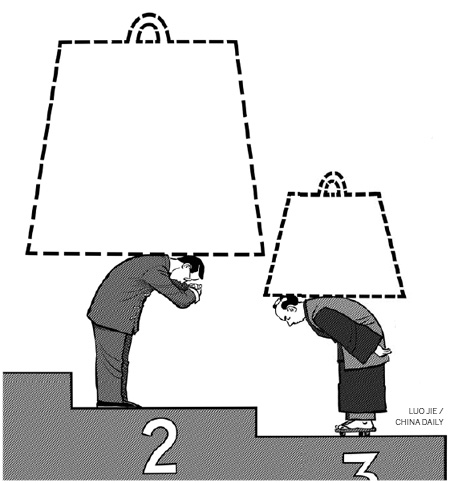Op-Ed Contributors
Take responsibilities as they come
By Hiroshi Matsuno (China Daily)
Updated: 2010-08-30 08:52
 |
Large Medium Small |
GDP is an index that demonstrates the economic scale of a country and the influence it exercises. That China's GDP is reportedly the second largest in the world signifies it is the second most influential economy and its degree of influence on the world economy now is far beyond its people's imagination.
China's responsibilities have grown correspondingly with its economy and influence. And though it has been saying it is impossible for it, as a developing country with a rather low per capita GDP, to shoulder more responsibilities, it is hard for it to win international support because of its global influence and the emerging resource and energy problems across the world. This means China has to shoulder responsibilities corresponding to the size of its economy.
Until a few years ago, Japanese could not have imagined, let alone believed, the high speed of China's economic growth. But people with such ideas are reducing in number. It was a matter of course that a country with a population 10 times larger and a territory 25 times bigger than Japan's would have a larger economy, too. Most Japanese seem to have accepted this shift, and hence the development is hardly expected to affect Sino-Japanese relations.
It may be hard for China to achieve the average living standard of Japan, because it has a much higher population and a larger territory with more than 50 ethnic groups. But it is possible for it to build a "well-off" society if it makes full use of the fruits of its economic growth.
What I am interested in is how China will sustain its economic growth when its national wealth, accumulated through economic development, has not yet been distributed fairly among its people. The probable reason could be that the Chinese government exercises more executive powers compared with its counterparts in other countries while its people have little supervision rights. Problems such as environmental damage, high energy consumption and asset bubbles that China's economic growth has created can be attributed to this lack of supervision by the people.
Since Japan spent most of its national wealth, obtained during the fast growing period in the 1970s and 1980s, to reform and improve its national social management systems, it succeeded in building a fair and safe society. The many problems that have cropped up in Japanese politics and society in recent times, because of economic stagnation, can to some extent be seen as predestined characteristics of a mature country. But even in such a difficult situation, Japanese society remains stable with high economic and social indices. For example, it has the highest life expectancy in the world.
What China needs to do now is to spend more of its funds on building strong social management systems such as social security and disaster prevention. The game of money, played by some of the advantaged groups, will only keep the country away from real development.
Many scholars have said China's current economic state is quite similar to that of Japan's in the 1980s. But the operations of China's socialist market economy, especially the powerful macroeconomic control of the government, the management of the financial system and capital market, are rather different from Japan's back then. Besides, problems such as global warming and resource exhaustion make China's task all the more difficult than Japan's in the 1980s.
Chinese scholars have interpreted Japan's economic and social success differently. Japan's capital liberalization and revaluation of the yen in the 1970s was not subject to pressure from the US. The asset bubble in the real estate industry and its collapse in the 1980s were not because it agreed to revaluate its currency. Japan accepted the request to revaluate the yen because it realized the great influence its economy had on the rest of the world, and agreed to take on its global responsibilities. Only through coordination and cooperation with the world economy could Japan expect to develop further, as proved by its success in restructuring and boosting its economy in the 1980s.
The economic crisis in Japan in the late 1980s and 1990s was the result of the numerous mistakes the Japanese government made in a series of policymaking decisions. But Japan has learned from its past and knows how the developed world should tackle the economic crisis.
The lesson China now needs to learn is that "the economic operation of a large country can only mitigate potential risks of all kinds by coordinating with the international community". Some Chinese officials' proposition that "China will choose its own way" would draw unnecessary condemnation from the international community. How many countries would offer help when one day China's economic growth slows down and faces resource or energy shortage is of great importance in this era of globalization.So, despite being a developing country, China cannot avoid shouldering additional responsibilities. Times are changing. From now on China's "national interests" will be closely associated with global economic prosperity. And hopefully, it will become a more active member of the international community and contribute to global organizations' success and rule-making process.
The author is a senior consultant at Normura Research Institute and Tsinghua-NRI China Research Institute.
